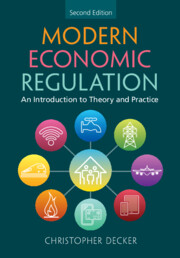Modern Economic Regulation
Economic regulation affects us all, shaping how we access essential services such as water, energy and transport, as well as how we communicate with one another in the digital world. Modern Economic Regulation describes the core insights of economic theory on which regulatory policies are based and connects this with evidence of how regulation is applied. It focuses on fundamental questions such as: why are certain industries regulated? What principles can inform regulation? How is regulation implemented? Which regulatory policies have been more, or less, effective in practice? All chapters in this second edition are fully updated to reflect the latest research and evidence, while five new chapters cover behavioural economics and the regulation of rail, aviation, payment systems and digital platforms. Each chapter contains discussion questions and topical case studies, and online materials include over 60 applied exercises that explore real-life regulatory problems from around the world.
- Explains the main debates and trade-offs that confront regulators, allowing readers to understand the challenges in applying theory in practical settings
- Explores the general reasons why certain activities and industries are subject to economic regulation, and the merits of alternative ways of regulating these activities
- Explains how context impacts regulation – for example, why the regulatory approach adopted in the water industry may need to differ from that of the telecommunications industry
- Details the importance of regulation in a way that can complement other texts and works that focus on specific policies or approaches
Reviews & endorsements
‘This is a fantastic textbook on modern economic regulation that beautifully integrates theory and practice like no other book on the market right now, plus it provides a great coverage of the structure and evolution of institutions in a number of key regulated industries.’ Christos Genakos, Cambridge Judge Business School, University of Cambridge
‘Chris Decker's new book/edition is an invaluable up-to-date analysis and review of the regulation of network industries. It contains a sophisticated treatment of more general or theoretical issues concerning regulation, including the key issue of institutional form, now supplemented by a new chapter on behavioural economics and regulation. The coverage in individual chapters is now expanded beyond the trio of energy, telecoms and water, to include payment systems, aviation and rail, and digital platforms - a huge focus of current regulatory interest. All chapters draw illustrations from the experience of several different countries. Readers can determine how much detail they want to go into, from a more basic understanding to a more granular and up-to-date account of recent developments and directions of change. There is also a very extensive bibliography.’ Martin Cave, London School of Economics
‘Modern Economic Regulation was already the best and most comprehensive economics of regulation text on the market, and now, with the addition of chapters on the regulation of payment systems, digital platforms, railways and aviation, as well as the interaction of behavioural economics and regulation, it is even better! Assign it to your master’s and advanced undergraduate students, as I do to mine.’ Russell Pittman, Visiting Professor, Kyiv School of Economics and Director of Economic Research, Antitrust Division, US Department of Justice
Product details
August 2023Paperback
9781009087735
774 pages
244 × 170 × 36 mm
1.45kg
Available
Table of Contents
- List of figures
- List of tables
- List of boxes
- Preface to the second edition
- Acknowledgements
- List of selected acronyms and abbreviations
- 1. Introduction
- Part I. 2. The perennial question: why regulate?
- 3. Is economic regulation inevitable?
- Part II. 4. Principles of regulation for core network activities
- 5. Forms of price regulation
- 6. Regulation in the presence of competition
- 7. Behavioural economics and regulation
- Part III. 8. The institutions of regulation
- 9. Electricity regulation
- 10. Gas regulation
- 11. Telecommunications regulation
- 12. Payment systems regulation
- 13. Digital platforms regulation
- 14. Rail regulation
- 15. Aviation regulation
- 16. Water and wastewater regulation
- 17. Conclusions
- Cases and legislation
- Bibliography
- Index.




